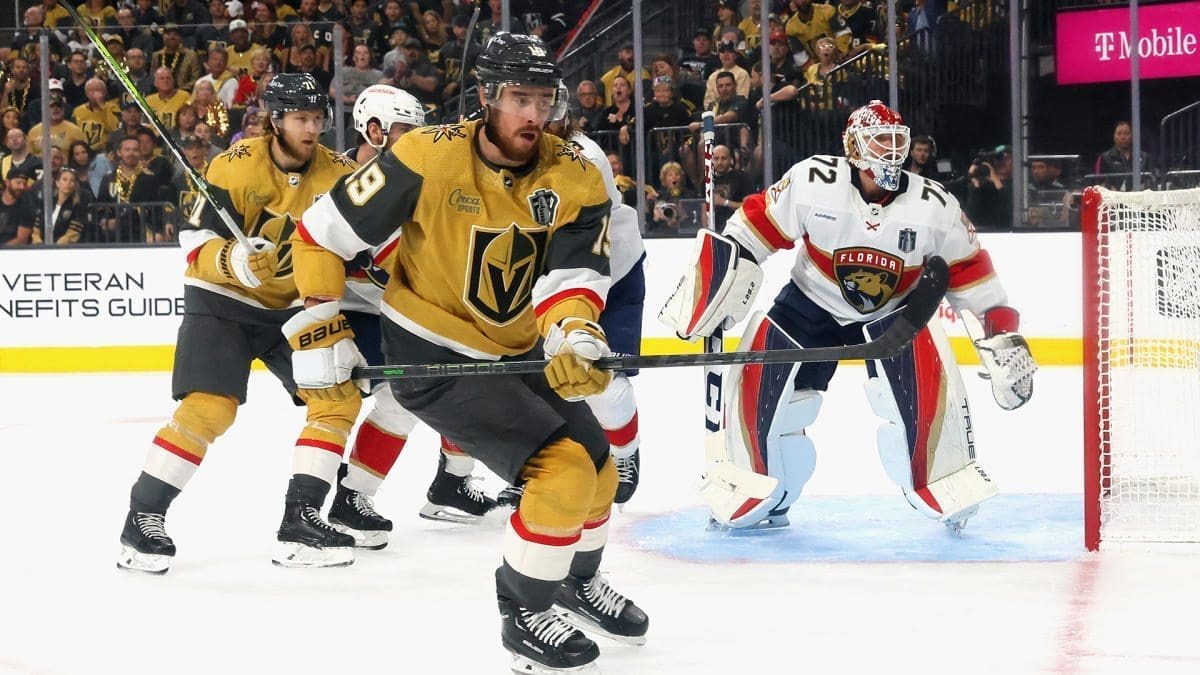The Vegas Golden Knights secured their first-ever Stanley Cup in a decisive 9-3 victory over the Florida Panthers on Tuesday at T-Mobile Arena in Las Vegas. In just their sixth season, the team has achieved a feat that many franchises have spent decades pursuing.

The top-seeded Knights overwhelmed the Panthers, the Eastern Conference’s eighth seed, in a five-game series marked by their high-speed, aggressive play. Both teams were making their second appearance in the finals, but while the Panthers fell short of a championship for the first time since 1996, the Knights became the second-fastest team to win the Cup in the expansion era that began in 1967, bested only by the Edmonton Oilers.
Vegas winger Jonathan Marchessault, who was selected from the Panthers in the expansion draft, said, “We waited a lot of time for that moment to come back and we wanted to make sure we cashed in. This team has been unbelievable since the beginning.” Marchessault, a member of the Knights’ original “misfit” squad, went on to win the Conn Smythe Trophy as the most valuable player in the playoffs.
The ceremonial passing of the Cup began with captain Mark Stone, who handed it off to Reilly Smith, another player from the inaugural season. Smith then passed it to Marchessault, solidifying the victory for the Knights.
Despite a shaky start to Game 5, the Golden Knights took control 12 minutes into the first period when Stone scored an unassisted short-handed goal. They scored again less than two minutes later, setting the tone for the rest of the match. In the second period, Vegas scored four times in under 10 minutes, with Stone contributing a second goal to establish an insurmountable lead.
The Panthers, missing their leading scorer Matthew Tkachuk due to injury, found themselves outmatched by a hungrier Vegas team. As the third period wound down, Knights fans eagerly anticipated a celebration that few could have imagined just six years ago, their excitement amplified by a raucous in-house DJ, cheerleaders, and an over-the-top light show.
From Skepticism to Success
The annals of the NHL are filled with stories of failed franchises, including expansion clubs and teams that have relocated multiple times. Do the names Cleveland Barons, Kansas City Scouts, or Minnesota North Stars ring a bell?
So, when Commissioner Gary Bettman announced the Las Vegas-based Golden Knights as the league’s 31st team during a 2016 news conference, many critics were skeptical. As the desert heat climbed to 108 degrees outside, Bettman addressed concerns about the viability of a professional hockey team in a city where many residents are retirees or work night shifts in service jobs.
Las Vegas has seen a string of minor league hockey teams, such as the Gamblers, Outlaws, Aces, Thunder, and Ice Dice, struggle to find their footing. The Coyotes, having relocated to Arizona from Winnipeg for the 1996-97 season, found themselves in such dire financial straits that the NHL had to intervene. Perhaps hockey wasn’t meant for the desert.
Despite these doubts, Bettman highlighted the city’s growing population and its reputation as an entertainment hub. “We think this is a tremendously exciting opportunity not just for Las Vegas but for the league as well,” he proclaimed.
Skeptics also questioned the wisdom of adding a franchise in a city known for legal sports gambling, something sports leagues, including the NHL, had long avoided. Bettman countered, arguing that betting on hockey was not as popular as football, minimizing the risk of players throwing games. “We don’t worry about the integrity of our game,” he asserted.
In the years since, the Golden Knights have defied expectations, proving that even in the desert, hockey can flourish.
In a remarkable turn of events, the Vegas Golden Knights overcame significant obstacles during their inaugural season, proving that Las Vegas could support a major professional sports team. The team sold more than 14,000 season tickets before they even had a name, and moved into the already open T-Mobile Arena on the Strip.
However, tragedy struck after the team’s final preseason game when a gunman opened fire on a concert near the Mandalay Bay hotel, killing 58 people and wounding hundreds. In the wake of this harrowing event, the Golden Knights became a unifying force in the city. Players visited the community, thanking police officers, donating blood, and contributing tens of thousands of dollars to help victims, their families, and emergency medical workers.
This compassionate response endeared the Knights to the city’s grieving residents, and the team went on an unprecedented run. Led by three-time Stanley Cup champion Marc-André Fleury, the Knights shattered league records for a first-year team, amassing 109 points and a .622 winning percentage in the regular season. They advanced through three rounds of the playoffs before ultimately falling to the Washington Capitals in the Stanley Cup finals.
LongtimeLas Vegas resident Brad Kreel summed up the season by saying, “The team wrapped themselves around the town, and the town wrapped themselves around the team.”
Following the Knights’ success, other professional sports teams have joined or are considering relocating to Las Vegas, such as the WNBA’s Aces, the NFL’s Raiders, and potentially the MLB’s Athletics. The Golden Knights have now made the playoffs in five of their six seasons, demonstrating the viability of a pro sports team in Las Vegas.
“It’s the best feeling in the world,” said Vegas center Jack Eichel. “It’s a really special organization, and I just feel blessed to be a part of it.” As for the celebration that the city has in store, teammate Jonathan Marchessault grinned and said, “I don’t know. Probably a big one.”



